人教版九年级英语第十单元知识点复习总结
人教版九年级英语Unit10知识点总结

Unit 10 You一、词性转换Section A1. greet f n.) greeting2. relaxed f Q) relax3. value f (adj.) valuable二短语归纳1. shake hands 握手2. for the first time 第一次;首次3. be expected to 被期望4. arrive at 到达5. make mistakes 犯错误6. as soon as 一 就 ..7. hold out 伸出8. greet each other 相互打招呼9. to one ’ s surprise 使某人吃惊的是10. on both sides of 在 .. 的两边11. find out 查明;弄清 Section B7. basic f (n) base8. gradually f adj.) gradual9. suggestion f (v.) suggest24. go out of one ' s way 特地;格外努力25. make- • • feel at home 使(某 人)感到宾至如归26. because of 由于 27. cut up 切碎 28. get used to 习惯于 29. be excited about 对 .. 感到兴奋30. look forward to doing sth.盼望做某事31. show up 出现三.句型集萃1. be supposed to do sth. 应该做某事2. be expected to do sth. 被期望应该做某事3. It ' s impolite if you 如果你 是不礼貌的4. I wouldn ' t mind that!我不会介意这个5. It ' s + adj. + for sb. to do sth 某人做某事是的6. v. + as + adj + as + sb. can 尽可能 做某事7. It is + adj. + to do sth. 做某事是 的8. keep sb. waiting 让某人等待五、重点句九年级英语re supposed to shake hands4. mad f ( n.) madness5. northern fn(.) north12. everyday lives 日常生活 13. drop by 顺便访问; 随便进入14. make plans to do sth.计划做某事15. on time 准时 16. after all 毕竟;终归 17. get mad 大动肝火;气愤 18. make an effort 作出努力 19. no big deal 没什么大事 20. clean …off 把 .. 擦掉 21. take of 脱下(衣服) ;(飞机等)起飞22. point at 指向;对准1. That ’ s how people in Japan are expected to greet each other. 那是人们在日本彼此打招呼应该做的。
九年级英语unit10知识点人教版

九年级英语unit10知识点人教版九年级英语Unit 10知识点梳理九年级英语Unit 10是中学九年级英语教材中的重要一单元。
本单元主要围绕“科技与未来”这一主题展开,涉及到科技的发展、科技的影响以及科技对未来的预测等内容。
以下是对该单元中的重要知识点进行梳理和总结。
一、词汇知识1. Technology(科技):指人类在实践和认识的基础上创造和运用各种各样的人工产品和方法的总和。
2. Invent(发明):指通过创造性思维和实践活动创造、发明新产品、新方法或新方式。
3. Discover(发现):指通过研究、观察或实践活动等方式找到新的事物、现象或知识。
4. Inventor(发明家):指根据自己的创造性思维和实践活动创造新产品、新方法或新方式的人。
5. Internet(互联网):指全球性的计算机网络,通过电信网络连接起来,从而形成一个全球性数据通信网络。
6. Robot(机器人):指能够完成特定任务的自动化机器。
7. Virtual reality(虚拟现实):指通过计算机生成的一种仿真环境,使用户能够与虚拟世界进行交互。
8. Site(网站):指通过互联网发布信息或提供服务的网络空间。
二、语法知识1. Passive voice(被动语态):当我们强调动作的接受者时,可以使用被动语态。
由“be + 过去分词”构成,过去分词作为谓语的主要成分。
例如:The book was written by Mark Twain.(这本书是马克·吐温写的。
)2. Adjective clauses(定语从句):用来修饰名词或代词的从句,通常由关系代词(who, which, that)或关系副词(when, where)引导。
例如:The girl who is sitting next to me is my best friend.(坐在我旁边的女孩是我最好的朋友。
)三、阅读技巧阅读是英语学习的重要环节,九年级英语Unit 10也有涉及到科技和未来的阅读材料。
人教版英语九年级unit10知识点总结

人教版英语九年级unit10知识点总结Unit 10 Knowledge Points Summary - A Comprehensive Guide to Mastering EnglishIntroductionEnglish is a universal language that opens up numerous opportunities for communication, education, and career advancement. In unit 10 of the 9th-grade English course, several essential knowledge points are covered. This article aims to provide a comprehensive summary of these points and offer valuable insights to help students master English effectively.1. VocabularyVocabulary acquisition plays a crucial role in language learning. In unit 10, students encounter a variety of vocabulary words related to environment and pollution. To enhance their vocabulary skills, it is beneficial to adopt different strategies, such as reading extensively, using flashcards, and engaging in regular practice exercises. By incorporating new words into daily conversations or writing exercises, students can reinforce their understanding and retention.2. GrammarGrammar is the backbone of any language, including English. In unit 10, students focus on several essential grammar points. Firstly, they learn about the Passive Voice, which is used when the subject of the sentence is acted upon, rather than acting. Understanding the passive voice is essential for effective communication and diverse writing styles.Additionally, students delve into the usage of Modal Verbs, which express ability, possibility, necessity, or permission. Practicing modal verbs in different contexts can significantly improve students' language accuracy and fluency. It is also crucial to grasp the differences between similar modal verbs, such as 'can' and 'could', as well as 'may' and'might'.3. Reading ComprehensionEnhancing reading comprehension skills is vital for understanding complex texts and broadening one's knowledge. Unit 10 introduces students to a variety of reading passages related to environmental issues and conservation efforts. To improve reading comprehension, it is beneficial to scan the text beforehand for contextual clues, skimming for the main idea, and reading actively by underlining or highlighting key points. Students can also practice summarizing the texts to ensure a deeper understanding of the content.4. Listening SkillsListening is an integral part of effective communication. Unit 10 provides listening exercises centered around environmental concerns, such as global warming and deforestation. To enhance listening skills, it is essential to expose oneself to different types of audio resources, including podcasts, songs, and videos. Practicing listening comprehension regularly helps students develop their ability to identify key information, infer meaning from context, and recognize different accents and speech patterns.5. Speaking PracticeUnit 10 encourages students to engage in discussions related to environmental issues. This provides an excellent opportunity for students to express their opinions, debate varying viewpoints, and develop critical thinking skills. To improve speaking proficiency, it is beneficial to participate actively in classroom discussions, join speaking clubs or language exchange programs, and practice pronunciation and intonation patterns regularly.6. Writing SkillsWriting is an essential skill that enables effective expression and communication. In unit 10, students are encouraged to writeargumentative essays or persuasive speeches concerning environmental protection. To improve writing skills, it is crucial to develop a clear thesis statement, organize ideas logically, and provide supporting evidence. Students should also focus on enhancing their vocabulary usage, grammar accuracy, and overall coherence and cohesion in their writing.ConclusionUnit 10 of the 9th-grade English course covers significant knowledge points that are essential to mastering English. It is vital for students to develop vocabulary skills, grasp important grammar concepts, enhance reading and listening comprehension, improve speaking proficiency, and refine writing abilities. By dedicating time and effort to these areas, students will significantly enhance their English language proficiency and open doors to endless opportunities in their personal and professional lives.。
人教版九年级全一册英语Unit10重点语法知识点总结
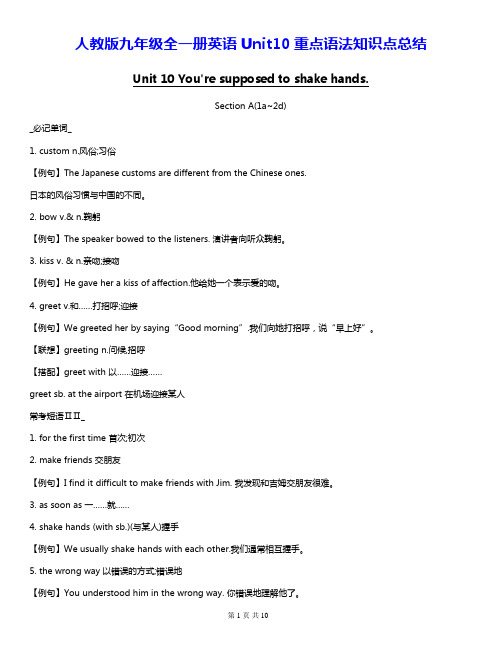
人教版九年级全一册英语Unit10重点语法知识点总结Unit 10 You're supposed to shake hands.Section A(1a~2d)_必记单词_1. custom n.风俗;习俗【例句】The Japanese customs are different from the Chinese ones.日本的风俗习惯与中国的不同。
2. bow v.& n.鞠躬【例句】The speaker bowed to the listeners. 演讲者向听众鞠躬。
3. kiss v. & n.亲吻;接吻【例句】He gave her a kiss of affection.他给她一个表示爱的吻。
4. greet v.和……打招呼;迎接【例句】We greeted her by saying“Good morning”.我们向她打招呼,说“早上好”。
【联想】greeting n.问候,招呼【搭配】greet with 以……迎接……greet sb. at the airport 在机场迎接某人常考短语ⅡⅡ_1. for the first time 首次;初次2. make friends 交朋友【例句】I find it difficult to make friends with Jim. 我发现和吉姆交朋友很难。
3. as soon as 一……就……4. shake hands (with sb.)(与某人)握手【例句】We usually shake hands with each other.我们通常相互握手。
5. the wrong way 以错误的方式;错误地【例句】You understood him in the wrong way. 你错误地理解他了。
6. hold out 伸出(手等)7. greet each other 互相问候8. to one’s surprise 令某人惊讶的是经典句型ⅢⅡ1. That's how people in Japan are expected to greet each other.那就是在日本人们互相问候的方式。
人教版九年级英语第十单元知识点

1. You are supposed to shake hands.be supposed to do…应该……被期望做……,当句子的主语是人时,它可以用来表示劝告,建议,义务,责任等,意思是“to be expected to do sth., or to have to do sth.”“(按规定、习惯、安排等)应该做某事,可用来表示劝告、建议、义务、责任等,相当于should的用法。
否定形式为“be not supposed to do sth.”表示不该或禁止做的情。
e.g. If you want to eat ice-cream, you are supposed to ask you mum. 如果你想吃冰淇淋,应该先问问你妈妈。
e.g. You’re supposed to ask the teacher if you want to leave the classroom.如果你要离开教室,应该先问问老师。
We are not to supposed to play football on Sunday. 不准我们在星期日踢足球。
2. That’s how people in Japan are expected to greet each other.greet =to welcome or say “hello”动词“问候,打招呼”e.g. He greeted her by saying “good morning”. 他向她打招呼说“早上好”。
She greeted me with a friendly smile. 她向我微笑致意。
be expected to表达“被期许(预期)会做某事, 希望做某事,表示一种可能性。
e.g. She was expected to arrive before dinner. 希望她晚餐前到达。
be supposed to do相对于be expected to do主观性更强一些。
Unit10笔记人教版英语九年级全册

Unit 10 知识梳理总结【词汇梳理】greet(v.和......打招呼;迎接)→ greeting (n. )relax(v.放松;休息)→ relaxed (adj. 放松的;自在的)→ relaxing (adj. 令人放松的)value(n.价值)→valuable(adj.贵重的;宝贵的)→ be of great value很有价值north(n.北;北方;adv.朝北;向北)→northern(adj.北方的;北部的)east(n.东;东方;adv.朝东;向东)→eastern(adj.东方的;东部的)behave(v.表现;举止)→ behavior (n. 行为;举止;态度)→wellbehaved表现好的suggest(v.建议)→ suggestion (n. 建议)drop by(顺便拜访)→ dropped(过去式;过去分词)【短语归纳】shake hands握手be supposed to do 应该做某事for the first time首次;第一次make mistakes犯错误as soon as 一......就...... hold out伸出to one’s surprise令某人惊讶的是find out查明;弄清(情况)the capital of... ......的首都at noon在中午be/get mad at/with sb. 对某人很生气drop by顺便拜访;随便进入as...as sb. can/could某人尽可能...... on time准时after all毕竟;终归get mad大动肝火;气愤make an effort做出努力big deal重要的事;大人物on/at the coast在海边knock on/at the door敲门table manners餐桌礼仪take off脱下(衣服);(飞机)起飞be worth doing值得做...... stick sth. into将某物插入point at指向go out of one’s way特地;格外努力make sb. feel at home使某人感到宾至如归be excited about... 对......感到兴奋look forward to+doing 期望做某事show up出现;露面【考点总结】1.You’re supposed to shake hands.be supposed to 应该,相当于shoulde.g.We are supposed to help each other.=We should help each other.【注】suppose意为“认为;推断”时,其后常接宾语从句,在宾语从句中否定要前移。
人教版九年级英语第十单元知识点总结(推荐文档).doc
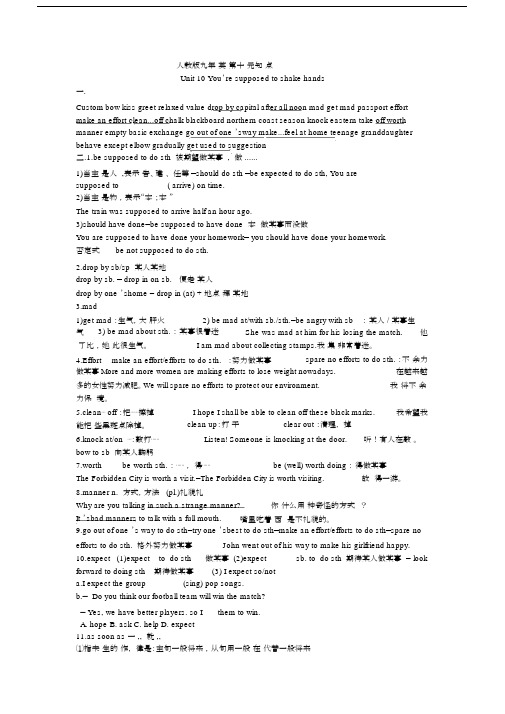
人教版九年英第十元知点Unit 10 You’re supposed to shake hands一.Custom bow kiss greet relaxed value drop by capital after all noon mad get mad passport effort make an effort clean...off chalk blackboard northern coast season knock eastern take off worth manner empty basic exchange go out of one ’sway make...feel at home teenage granddaughter behave except elbow gradually get used to suggestion二.1.be supposed to do sth 被期望做某事 ,做 ......1)当主是人 ,表示告、建、任等 =should do sth =be expected to do sth, You aresupposed to___________( arrive) on time.2)当主是物,表示“本;本”The train was supposed to arrive half an hour ago.3)should have done=be supposed to have done 本做某事而没做You are supposed to have done your homework= you should have done your homework.否定式be not supposed to do sth.2.drop by sb/sp 某人某地drop by sb. = drop in on sb. 便走某人drop by one ’shome = drop in (at) + 地点拜某地3.mad1)get mad :生气,大肝火2) be mad at/with sb./sth.=be angry with sb :某人 / 某事生气3) be mad about sth. :某事很着迷She was mad at him for his losing the match. 他了比,她此很生气。
新目标人教版九年级英语(10—14单元)知识点总结
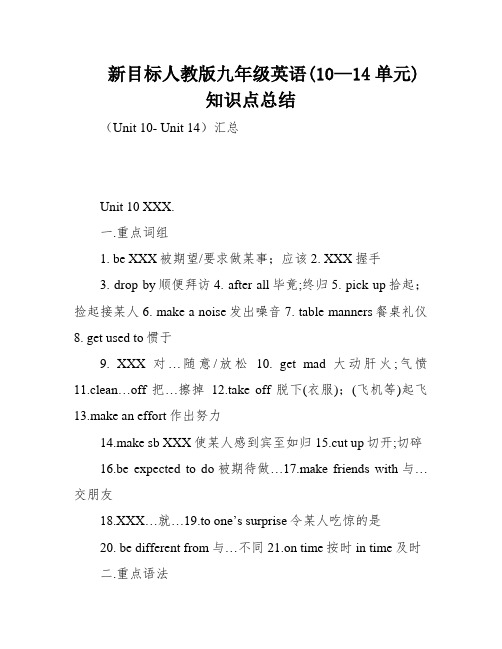
新目标人教版九年级英语(10—14单元)知识点总结(Unit 10- Unit 14)汇总Unit 10 XXX.一.重点词组1. be XXX被期望/要求做某事;应该2. XXX握手3. drop by顺便拜访4. after all毕竟;终归5. pick up拾起;捡起接某人6. make a noise发出噪音7. table manners餐桌礼仪8. get used to惯于9. XXX对…随意/放松10. get mad大动肝火;气愤11.clean…off把…擦掉12.take off脱下(衣服);(飞机等)起飞13.make an effort作出努力14.make sb XXX使某人感到宾至如归15.cut up切开;切碎16.be expected to do被期待做…17.make friends with与…交朋友18.XXX…就…19.to one’s surprise令某人吃惊的是20. be different from与…不同21.on time按时in time及时二.重点语法1.(1)suppose:猜测;假定XXX透露施展阐发“推测;假定”,that可省例:XXX.(2)be XXX被期望做某事,应该做某事。
相当于should 和ought to例:XXX.XXX to say hello to the foreigners.【练】You are supposed _____ hands when you meet for the first time.A. to shakeB. shakeC. shakingD. shook2. make plans to do == plan to do.打算做某事例She has made plans to go to Beijing.=She has planed to go to Beijing.go out of one’s way to do特意,专门做某事例:He went out of his way to make me happy.3. In Switzerland,it’XXX.阐发:it是方式主语,不定式是真正的主语。
人教版新目标英语九年级-Unit10单元知识点小结
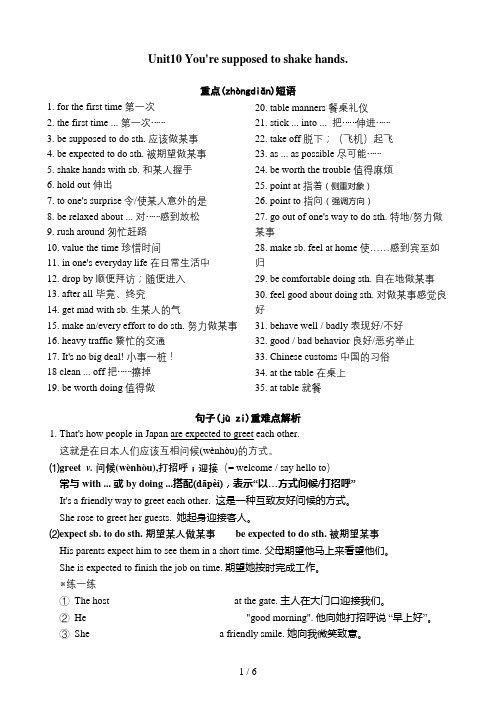
Unit10 You're supposed to shake hands.重点(zh òngdi ǎn)短语句子(j ù zi)重难点解析 1. That's how people in Japan are expected to greet each other.这就是在日本人们应该互相问候(wènhòu)的方式。
⑴greet v. 问候(wènhòu),打招呼;迎接(= welcome / say hello to )常与with ... 或by doing ...搭配(dāpèi),表示“以…方式问候/打招呼”It's a friendly way to greet each other. 这是一种互致友好问候的方式。
She rose to greet her guests. 她起身迎接客人。
⑵expect sb. to do sth. 期望某人做某事 be expected to do sth. 被期望某事His parents expect him to see them in a short time. 父母期望他马上来看望他们。
She is expected to finish the job on time. 期望她按时完成工作。
※练一练① The host ________________________ at the gate. 主人在大门口迎接我们。
② He _______________________________ "good morning". 他向她打招呼说 “早上好”。
③ She _________________________ a friendly smile. 她向我微笑致意。
1. for the first time 第一次2. the first time ... 第一次……3. be supposed to do sth. 应该做某事4. be expected to do sth. 被期望做某事5. shake hands with sb. 和某人握手6. hold out 伸出7. to one's surprise 令/使某人意外的是8. be relaxed about ... 对……感到放松9. rush around 匆忙赶路10. value the time 珍惜时间11. in one's everyday life 在日常生活中12. drop by 顺便拜访;随便进入13. after all 毕竟、终究14. get mad with sb. 生某人的气15. make an/every effort to do sth. 努力做某事16. heavy traffic 繁忙的交通17. It's no big deal! 小事一桩!18 clean ... off 把……擦掉19. be worth doing 值得做20. table manners 餐桌礼仪 21. stick ... into ... 把……伸进…… 22. take off 脱下;(飞机)起飞 23. as ... as possible 尽可能…… 24. be worth the trouble 值得麻烦 25. point at 指着(侧重对象) 26. point to 指向(强调方向) 27. go out of one's way to do sth. 特地/努力做某事 28. make sb. feel at home 使……感到宾至如归 29. be comfortable doing sth. 自在地做某事 30. feel good about doing sth. 对做某事感觉良好 31. behave well / badly 表现好/不好 32. good / bad behavior 良好/恶劣举止 33. Chinese customs 中国的习俗 34. at the table 在桌上 35. at table 就餐 36. show up 出现;显现;赶到;使……出丑2. Where I'm from, we are pretty relaxed about time. 我来的那个地方(dìfāng)对时间非常放松。
人教版英语九年级第十单元知识点
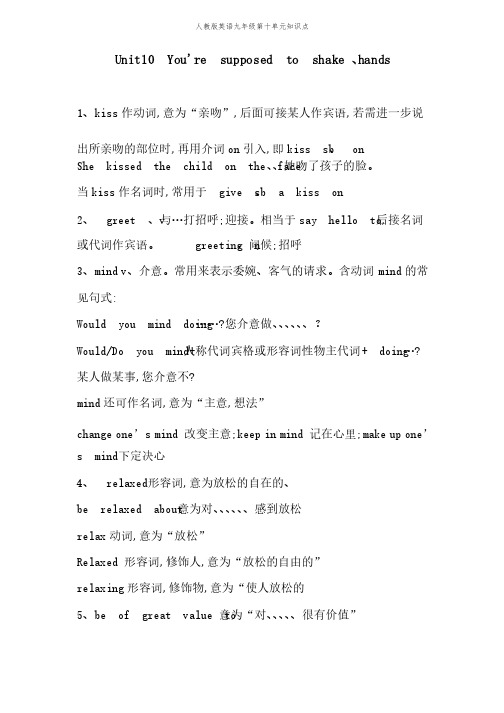
人教版英语九年级第十单元知识点Unit10 You're supposed to shake hands 、1、kiss 作动词作动词,,意为“亲吻”意为“亲吻”,,后面可接某人作宾语后面可接某人作宾语,,若需进一步说出所亲吻的部位时出所亲吻的部位时,,再用介词on 引入引入,,即kiss sb、 on She kissed the child on the face 、、她吻了孩子的脸。
、她吻了孩子的脸。
当kiss 作名词时作名词时,,常用于常用于 give sb give sb、 a kiss on 2、 greet v 、与…打招呼、与…打招呼;;迎接。
相当于say hello to,后接名词或代词作宾语。
或代词作宾语。
greeting n greeting n 、问候、问候;;招呼招呼3、mind v 、介意。
常用来表示委婉、客气的请求。
含动词mind 的常见句式见句式: :Would you mind doing …………??您介意做、、、、、、?、?Would/Do you mind+人称代词宾格或形容词性物主代词人称代词宾格或形容词性物主代词+ doing + doing …? 某人做某事某人做某事,,您介意不您介意不? ?mind 还可作名词还可作名词,,意为“主意意为“主意,,想法”想法”change one one’’s mind 改变主意改变主意;keep ;keep in mind 记在心里记在心里;make ;make up one one’’s mind 下定决心下定决心下定决心 4、 relaxed 形容词形容词形容词,,意为放松的自在的、意为放松的自在的、be relaxed about 意为对、、、、、、感到放松、感到放松relax 动词动词,,意为“放松”意为“放松”Relaxed 形容词形容词,,修饰人修饰人,,意为“放松的自由的”意为“放松的自由的”relaxing 形容词形容词,,修饰物修饰物,,意为“使人放松的意为“使人放松的5、be of great value to 意为“对、、、、、很有价值”、很有价值”6、be/get mad at/ with sh sh、、意为“生某人的气”,相当于be/get angry with sb 、be mad about 意为“对、、、、、、迷恋”、迷恋”7.7. knock into 与…相撞与…相撞;;撞到撞到; ;knock down 击倒击倒;;撞倒、撞倒、knock over 打翻打翻8 、 be worth doing 意为“值得做”意为“值得做”be worth+钱意为“值多少钱钱意为“值多少钱be worth+名词意为“值得……”名词意为“值得……”名词意为“值得……” 8.8. manner 作名词作名词,,意为“方式意为“方式;;方法”方法”,,通常用单数形式通常用单数形式manners 为其复数形式为其复数形式,,意为“礼貌意为“礼貌;;礼仪”。
人教版英语九年级Unit10单元知识点归纳

Unit10 You're supposed to shake hands.【重点短语】1. be supposed to do 被期望/应该做......2. shake hands 握手3. for the first time 第一次4. table manners 餐桌礼仪5. drop by 偶然拜访,顺便拜访6. after all 毕竟,终究7. be on time 准时8.(in)the wrong way 以错误的方式9. be relaxed about 对……比较随意/放松10. a bit 一点【重点句型】1. He should have told me about it. 他本应该把这件事告诉我。
2. Where I’m from, we’re pretty relaxed about time. 我所在的地方,对时间是相当宽松的。
3. We often just drop by our friends’homes. 我们时常去朋友家拜访。
4. Often we just walk around the town center, seeing as many of our friends as we can. 我们经常走遍市中心,看尽可能多的朋友。
5. We usually make plans to see friends. 通常我们都是做好去看朋友的计划。
6. We’re the land of watches, after all. 毕竟,我们是表之乡。
7. It’s even better than I thought it would be. 事情比我想象的要好得多。
8. They go out of their way to make me feel at home. 他们花尽心血让我感觉不到拘束。
9. Although I still make lots of mistakes, it doesn’t bother me like it used to. 尽管我经常出一些错,但它不像过去那样打扰我。
人教版九年级英语Unit10单元知识点梳理

Unit 10 You're supposed to shake hands.一、短语:1.be supposed to do sth应该做…2.be expected to do sth.应该/被期望做…3.shake hands(with…)(和…)握手4.bow to sb.向某人鞠躬5.for the first time首次,第一次6.people in Korea韩国的人们7.greet sb.(in)the wrong way以错误的方式问候某人8.be invited to sw.被邀请去…...9.be invited to do sth.被邀请做…10.welcome party欢迎会11.as soon as一…就…...(引导时间状从)12.as soon as sb can尽可能快的......13.hold out(my hands)伸出(我的手)14.on both sides of my face在我的两个脸颊上15.be from=come from来自16.be relaxed about对…放松/随意17.a bit/little late晚一点18.value the time we spend with sb珍惜我们与某人度过的时间19.in our everyday lives在我们的日常生活中20.drop by顺便拜访,随便进入21.make plans(to do sth.)计划做某事22.plan to do sth.计划做某事23.on the side of the face在脸的一侧24.the town center在城镇中心25.as many as sb can=as many as possible尽可能多的…26.be on time守时27.the capital of clocks and watches钟表之都28.after all毕竟,终归29.at noon在中午30.15 minutes late迟到15分钟二、重点句子:1.Where I’m from,we’re pretty relaxed about time.我所在的地方,对时间是相当宽松的。
人教版初三英语 九年级 上册复习提纲 Unit 10

人教版初三英语(九年级上册复习提纲- Unit 10Unit101. 过去完成时(1 构成:由助动词had + 过去分词构成否定式:had not + 过去分词缩写形式:hadn’t(2 用法过去完成时表示在过去某一时间或动作之前已经发生或完成了的动作。
(3 它所表示的时间是“过去的过去”。
①表示过去某一时间可用by, before 等构成的短语来表示②也可以用when, before, after 等引导的时间状语从句来表示③还可以通过宾语从句或通过上下文暗示。
When I got there, you had already eaten you meal.当我到达那里时,你已经开始吃了。
By the time he got here, the bus had left. 到他到达这里时,汽车已经离开了2. by the time 直到…时候指从过去某一点到从句所示的时间为止的一段时间如:By the time we got to his house, he had finished supper. 在我们到达他就已经吃完了晚饭。
3. 英语中表示“把某物遗忘在某处”常用 leave + 地点而不是forget+地点如:Unluckily, I left my book at home不幸的是,我把书忘在家里了。
4. close v. 关 adv. 接近地靠近地 closed adj. 关的5. come out 出来6. on time 按时准时既不早也不迟 in time 及时指在时限到来之前7. luckily adv. 幸运地 lucky adj. 幸运的 luck n. 好运8. give sb. a ride 让某搭便车如: He often gives me a ride to school. 他经常让我搭便车去学校。
9.only just 刚刚好、恰好 10. go off (闹钟闹响 The alarm w ent off just now. 刚才警钟响了。
Unit10知识点总结人教版九年级英语全册

人教版九年级英语上册unit 10知识点总结一,短语总结Section Abe supposed to do sth. 应该做某事shake hands 握手meet for the first time 第一次见面be expected to do sth. 被期望/ 要求做某事an exchange student 一名交换生greet sb. the wrong way 以错误的方式和某人打招呼make some mistakes 犯一些错误wele party 欢迎派对as soon as 一……就……hold out my hand 伸出我的手to one’s surprise 令某人惊讶的是kiss sb. on both sides of sb.’s face 亲吻某人的脸颊be relaxed about time 时间观念不强a little / bit late 有点儿晚enjoy our time slowly 慢慢享受我们的时光value time 珍惜时间in our everyday lives 在我们的日常生活中drop by 顺便访问;随便进入make plans to do sth. / plan to do sth. 计划做某事be on time 守时 after all 毕竟;终归get mad 大动肝火;气愤make an effort to do sth. 努力做某事avoid heavy traffic 避开拥堵的交通keep sb. doing sth. 让某人一直做某事It’s no big deal. 这没什么大不了的。
wear a suit and tie 穿西装、打领带go abroad 出国clean ... off 把……擦掉during the winter season 在冬季期间take off 脱下(衣服);(飞机等)起飞pack warm clothes 打包暖和的衣服eastern European countries 东欧国家table manners 餐桌礼仪Section Bstick your chopsticks into the food 把筷子插进食物里use your chopsticks to hit an empty bowl 用你的筷子敲空碗point at anyone with your chopsticks 用筷子指着任何人thanks for ... 因……而感谢host family 寄宿家庭go out of one’s way 特地;格外努力make ... feel at home 使……感到宾至如归about one’s age 和某人年龄相仿be fortable doing sth. 轻松做某事the biggest challenge 最大的挑战learn how to behave at the dinner table 学习如何在餐桌上表现得体be different from ... 和……不同cut up 切碎 get used to 习惯于have a good school year 度过一个愉快的学年behave properly 举止得体have a safe trip 旅途安全show up 露面;出现knock on / at the door 敲门二,语法总结✅ You're supposed to shake hands.➡️be supposed to do sth.“应该做某事”,用来表示劝告,义务,责任,建议等。
2021-2022学年人教版英语九年级全册 Unit10 期末复习知识点详解与训练

2021-2022学年人教版英语九年级全Unit10期末复习知识点详解与训练一、知识点详解Section A1.In your country, what are you supposed to do when you meet someone for the first time?(1)be supposed to do sth 被期望做某事,应该做......,表示劝告、建议、责任等,=should =“to be expected to do sth,例:You are supposed to arrive on time(2)for the first time 首先,第一次【辨析】at first/first of all1) at first = at the beginning 最初,开始。
强调在时间顺序或做某事过程等开始之初2) first of all 首先,第一。
表明陈述事情的重要性【有关time的短语】in time 及时on time 准时have a good time玩得开心all the time一直,总是take one’s time 从容不迫kill the time:消磨时间at times 不时from time to time有时at that time 在那时at the same time 同时2.You’re supposed to shake hands 你应该握手。
shake→shook→shaken v 摇动,震动shake hands 握手shake hands with sb./ shake one's hands与某人握手例:You should shake hands with her when you meet her.3.In the United States, they’re expected to shake hands. 在美国,他们应该握手。
九年级人教英语unit10知识点

九年级人教英语unit10知识点Unit 10 Knowledge Points in 9th Grade People’s Education EnglishAs we approach the end of the school year, it's important to revise and consolidate the knowledge we have gained throughout the academic term. In this article, we will delve into the key concepts and skills covered in Unit 10 of the 9th Grade People's Education English curriculum. Let's explore these points in detail.1. Expressions and Phrases:Unit 10 introduces a variety of useful expressions and phrases related to studying and learning. Students learn how to describe their preferences, opinions, and experiences. Some examples include "I prefer studying alone," "In my opinion," and "I have had the pleasure of attending many interesting lectures." These phrases not only enhance their vocabulary but also help them to express themselves more effectively in different situations.2. Passive Voice:Unit 10 focuses on the usage and understanding of the passive voice. Students learn how to form passive voice sentences, understand the difference between active and passive voice, and gain insight into whenit is appropriate to use each. Passive voice sentences are often used in academic writing or when the subject is not essential to the meaning of the sentence. For example, "The book was written by a famous author" or "The decision was made by the committee." This knowledge enables students to construct more nuanced and sophisticated sentences.3. Reading Comprehension:Unit 10 provides students with a variety of reading materials to enhance their reading comprehension skills. Through different texts, students learn to identify main ideas, make inferences, and draw conclusions. They also practice decoding new vocabulary within context, improving their overall language proficiency. Reading comprehension is an essential skill that students will continue to develop throughout their academic journey and in their everyday lives.4. Writing Skills:Unit 10 includes lessons on different writing genres, such as emails, opinions, and letters. Students learn how to structure their writing effectively, including proper greetings and closing phrases, appropriate paragraphing, and clear and concise expressions of ideas. They also focus on using appropriate register and tone for different audiences and purposes. These writing skills will equip students with the ability to communicate effectively both academically and professionally.5. Grammar Review:Unit 10 offers a comprehensive review of various grammar concepts previously taught. Students revisit topics such as the past simple tense, modals, comparative and superlative forms, adverbial clauses of time, and relative clauses. This review helps students reinforce their understanding, correct any misunderstandings, and apply these grammar concepts accurately in their spoken and written language.In conclusion, Unit 10 of the 9th Grade People's Education English curriculum covers a wide range of knowledge points that are essential for students' language development. From improving their vocabulary and expressions to enhancing their reading comprehension and writing skills, this unit provides a solid foundation for their English language proficiency. By mastering these concepts and skills, students will be better equipped to face future challenges in their academic and professional lives.。
人教版英语九年级知识点总结Unit10
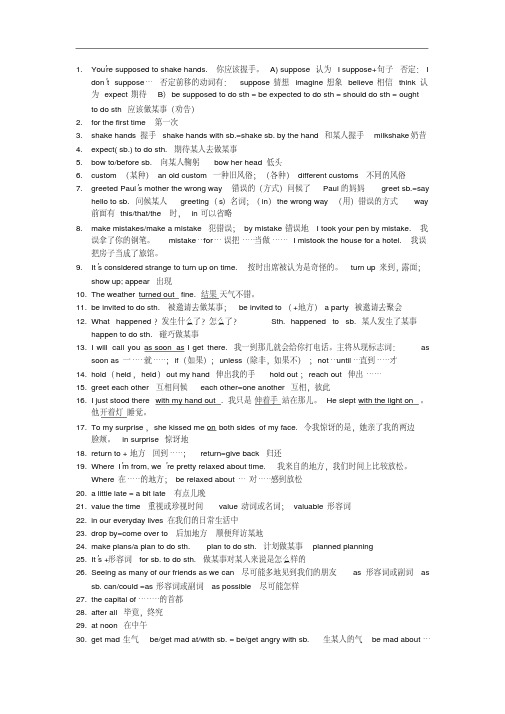
1.You’re supposed to shake hands. 你应该握手。
A) suppose 认为I suppose+句子否定:Idon’t suppose…否定前移的动词有:suppose猜想imagine想象believe相信think认为expect期待B)be supposed to do sth = be expected to do sth = should do sth = ought to do sth 应该做某事(劝告)2.for the first time 第一次3.shake hands 握手shake hands with sb.=shake sb. by the hand 和某人握手milkshake奶昔4.expect( sb.) to do sth. 期待某人去做某事5.bow to/before sb. 向某人鞠躬bow her head低头6.custom (某种)an old custom 一种旧风俗;(各种)different customs 不同的风俗7.greeted Paul’s mother the wrong way 错误的(方式)问候了Paul的妈妈greet sb.=sayhello to sb. 问候某人greeting(s)名词;(in)the wrong way (用)错误的方式way 前面有this/that/the时,in可以省略8.make mistakes/make a mistake 犯错误;by mistake错误地I took your pen by mistake. 我误拿了你的钢笔。
mistake…for…误把……当做……I mistook the house for a hotel. 我误把房子当成了旅馆。
9.It’s considered strange to turn up on time. 按时出席被认为是奇怪的。
新人教版九年级英语unit10知识点归纳

新人教版九年级英语unit10知识点归纳Unit 10: The Mystery of the RainforestIntroductionUnit 10 of the New Edition Grade 9 English textbook takes us on a fascinating journey into the heart of the rainforest. This unit is packed with knowledge about the biodiversity, environmental conservation, and the significance of the rainforest ecosystem. Let's dive in and explore the rich content of Unit 10.The Importance of RainforestsRainforests are incredibly vital to the health of our planet. They help to regulate the global climate, provide a home to countless species, and offer numerous resources for human beings. The rainforests act as the "lungs of the Earth," absorbing carbon dioxide and releasing oxygen into the atmosphere. Moreover, they are a source of medicinal plants and play a crucial role in maintaining the water cycle. Without rainforests, our planet would suffer from the adverse effects of climate change, loss of biodiversity, and disrupted ecological balance.Biodiversity in the RainforestThe rainforest is a treasure trove of biodiversity. It is estimated that around 50% of the world's plants and animal species call the rainforest their home. This incredible variety of life forms plays a vital role in maintaining the health and resilience of the ecosystem. The diverse array of plants and trees create a complex web of ecological relationships, contributing to the stability of the rainforest. It is essential for us to understand the value of preserving biodiversity and take steps to protect these fragile ecosystems.Threats to the RainforestUnfortunately, rainforests face numerous threats. Deforestation is one of the primary concerns plaguing these ecosystems. Trees are cut down to clear land for agriculture, logging, and urbanization, leading to habitat loss and an irreversible impact on biodiversity. Additionally, illegal hunting and the unsustainable extraction of resources are rapidly depleting the delicate balance of the rainforest. It is crucial for governments, organizations, and individuals to come together and implement sustainable practices for the preservation of these valuable ecosystems.Conservation EffortsVarious organizations and initiatives have been working tirelesslyto conserve rainforests. One example is the establishment of national parks and protected areas, where human activities are strictly regulated to minimize the impact on the ecosystem. Sustainable forestry practices, such as selective cutting and reforestation, are being promoted to curb deforestation. Additionally, raising awareness about the importance of rainforest conservation among local communities and the global population is essential in fostering a sense of responsibility and inspiring action.The Role of Education in Rainforest ConservationEducation plays a critical role in rainforest conservation. By teaching students about the significance of rainforests, you equip them with the knowledge and understanding required to take action. Educating young minds about the complexity of rainforest ecosystems, the importance of biodiversity, and the consequences of deforestation instills a sense of responsibility and empowers them to make informed decisions that benefit the environment. Education is a powerful tool that can inspire the next generation to protect and preserve our precious rainforests.ConclusionUnit 10 of the New Edition Grade 9 English textbook offers profound insights into the fascinating world of rainforests. It illustrates the importance of rainforests in sustaining life on Earth, the threats they face, and the urgent need for their conservation. By immersing ourselves in the knowledge contained within this unit, we gain a deeper understanding of the significance of rainforests and are equipped to become advocates for their protection. Let us embrace this knowledge and take action to ensure the future of these incredible ecosystems for generations to come.。
人教版九年级英语Unit 10知识点总结

九年级英语Unit 10 You’re supposed to shake hands 讲义一、词性转换Section A1. greet → (n.) greeting2. relaxed → (v.) relax3. value → (adj.) valuable4. mad → (n.) madness5. northern → (n.) north6. eastern – (n.) eastSection B7. basic → (n) base8. gradually→ (adj.) gradual9. suggestion → (v.) suggest二短语归纳1. shake hands 握手2. for the first time 第一次;首次3. be expected to 被期望4. arrive at 到达5. make mistakes 犯错误6. as soon as 一……就……7. hold out 伸出8. greet each other 相互打招呼9. to one’s surprise 使某人吃惊的是10. on both sides of 在……的两边11. find out 查明;弄清12. everyday lives 日常生活13. drop by 顺便访问;随便进入14. make plans to do sth. 计划做某事15. on time 准时16. after all 毕竟;终归17. get mad 大动肝火;气愤18. make an effort 作出努力19. no big deal 没什么大事20. clean…off 把……擦掉21. take of 脱下(衣服);(飞机等)起飞22. point at 指向;对准23. student exchange program交换生项目24. go out of one’s way 特地;格外努力25. make…feel at home 使(某人)感到宾至如归26. because of 由于27. cut up 切碎28. get used to 习惯于29. be excited about 对……感到兴奋30. look forward to doing sth.盼望做某事31. show up 出现三.句型集萃1. be supposed to do sth.应该做某事2. be expected to do sth. 被期望应该做某事3. It’s impolite if you… 如果你……是不礼貌的4. I wouldn’t mind that! 我不会介意这个5. It’s + adj. + for sb. to do sth 某人做某事是……的6. v. + as + adj + as + sb. can 尽可能……做某事7. It is + adj. + to do sth. 做某事是……的8. keep sb. waiting 让某人等待五、重点句子1. That’s how people in Japan are expected to greet each other. 那是人们在日本彼此打招呼应该做的。
人教版九年级英语第十单元 知识点总结

人教版九年级英语第十单元知识点总结Unit 10 You’re supposed to shake hands一.单词Custom bow kiss greet relaxed value drop by capital after all noon mad get mad passport effort make an effort clean...off chalk blackboard northern coast season knock eastern take off worth manner empty basic exchange go out of one’s way make...feel at home teenage granddaughter behave except elbow gradually get used to suggestion二.1.be supposed to do sth 被期望做某事,应该做......1)当主语是人时,表示劝告、建议、责任等=should do sth =be expected to do sth,You are supposed to___________( arrive) on time.2)当主语是物时,表示“本应;本该”The train was supposed to arrive half an hour ago.3)should have done=be supposed to have done本应该做某事而没做You are supposed to have done your homework= you should have done your homework.否定式为 be not supposed to do sth.2.drop by sb/sp 某人某地drop by sb. = drop in on sb. 顺便走访某人drop by one’s home = drop in (at) +地点拜访某地3. mad1) get mad:生气,大动肝火 2) be mad at/with sb./sth.=be angry with sb:对某人/某事生气 3) be mad about sth.:对某事很着迷 She was mad at him for his losing the match. 他输了比赛,她为此很生气。
- 1、下载文档前请自行甄别文档内容的完整性,平台不提供额外的编辑、内容补充、找答案等附加服务。
- 2、"仅部分预览"的文档,不可在线预览部分如存在完整性等问题,可反馈申请退款(可完整预览的文档不适用该条件!)。
- 3、如文档侵犯您的权益,请联系客服反馈,我们会尽快为您处理(人工客服工作时间:9:00-18:30)。
人教版九年级英语第十单元知识点总结Unit 10 You’re supposed to shake hands一.单词Custom bow kiss greet relaxed value drop by capital after all noon mad get mad passport effort make an effort clean...off chalk blackboard northern coast season knock eastern take off worth manner empty basic exchange go out of one’s way make...feel at home teenage granddaughter behave except elbow gradually get used to suggestion二.1.be supposed to do sth 被期望做某事,应该做......1)当主语是人时,表示劝告、建议、责任等=should do sth =be expected to do sth,You are supposed to___________( arrive) on time.2)当主语是物时,表示“本应;本该”The train was supposed to arrive half an hour ago.3)should have done=be supposed to have done本应该做某事而没做You are supposed to have done your homework= you should have done your homework.否定式为be not supposed to do sth.2.drop by sb/sp 某人某地drop by sb. = drop in on sb. 顺便走访某人drop by one’s home = drop in (at) +地点拜访某地3.mad1)get mad:生气,大动肝火2) be mad at/with sb./sth.=be angry with sb:对某人/某事生气3) be mad about sth.:对某事很着迷She was mad at him for his losing the match. 他输了比赛,她为此很生气。
I am mad about collecting stamps. 我对集邮非常着迷。
4.Effort make an effort/efforts to do sth.:努力做某事spare no efforts to do sth.:不遗余力做某事More and more women are making efforts to lose weight nowadays. 现在越来越多的女性努力减肥。
We will spare no efforts to protect our environment. 我们将不遗余力保护环境。
5.clean…off:把……擦掉I hope I shall be able to clean off these black marks. 我希望我能把这些黑斑点除掉。
clean up:打扫干净clear out:清理,丢掉6.knock at/on …:敲打……Listen! Someone is knocking at the door. 听!有人在敲门。
bow to sb 向某人鞠躬7.worth be worth sth.:值……钱,值得……be (well) worth doing:值得做某事The Forbidden City is worth a visit. =The Forbidden City is worth visiting. 故宫值得一游。
8.manner n. 方式,方法(pl.)礼貌礼仪Why are you talking in such a strange manner? 你为什么用这种奇怪的方式说话?It’s bad manners to talk with a full mouth. 嘴里吃着东西说话是不礼貌的。
9.go out of one’s way to do sth=try one’s best to do sth=make an effort/efforts to do sth=spare no efforts to do sth. 格外努力做某事John went out of his way to make his girlfriend happy. 10.expect (1)expect to do sth 预计做某事(2)expect sb. to do sth 期待某人做某事= look forward to doing sth 期待做某事(3) I expect so/nota.I expect the group ________(sing) pop songs.b.—Do you think our football team will win the match?—Yes, we have better players. so I ___them to win.A. hopeB. askC. helpD. expect11.as soon as 一……就……⑴指未发生的动作,规律是:主句一般将来时,从句用一般现在时代替一般将来时如:I will tell him the news as soon as he comes back。
⑵指紧接着发生的两个短动作,主从句都用一般过去时如He took out his English books as soon as he sat downI’ll go to visit my aunt in England ___the summer holidays start.A.while B.since C. until D. as soon as13.We often just walk around the town center, seeing as many of our friends as we can.walk around意为“到处走走”、“闲逛”的意思,“没有目的的行走”as... as one can/could 尽可能......,尽量...... = as ... as possibleseeing为现在分词短语作伴随状语,说明谓语动作发生时,另一个动作也在发生。
The teacher came into the classroom, holding a book in his hand.14.point at,point to,point outpoint at习惯上表示指向离说话人较近的事物,意为“指着”,at是介词,着重于指的对象。
point to用来表示指向离说话人较远的事物,意为“指向”,to也是介词,着重于指的方向。
point out表示的是给某人指示方向,要点或错误等,意为“指出”,out是副词。
He pointed _______ the house on the other side of the river and said,“That’s my home.”Don’t point ________ the words while you are reading.The teacher pointed _______ many mistakes in my homework.15.except “除……之外”(不包含在内)besides “除……之外(还)”(指除去的部分包括在前面提到的范围之内。
)All of us went to the park _____ Bob. He had to look after his sister. A. besides B. with C. Except —Is Jack good at basketball?—Yes. ______ basketball he is also good at table tennis.A.ExceptB. BesidesC. ButD. Beside16.for the first time /at first/first of all/the first timeat first起先;最初(类似at the beginning 最初,刚开始)We didn't trust him at first but..最初我们不相信他但后来相信了first of all 首先,关键点在于强调最重要的是,第一点是When you want to work for our country in the future, ____, we should have strong body and rich knowledge.A. at first B. first of all C. for the first time D. after allfor the first time 第一次the first time则是引导时间状语从句,when怎么引导时间状语从句的,the first time就能放在什么位置.只要记住把the first time看成是when,虽然意思不同,但用法相同,比如I thought her honest the first time I met her.17.hold out 伸出;坚持hold out one’s hands hold out my hand 伸出我的手She held out her hand to take the rope. 她伸手去抓那根绳子。
hold on 抓住; (打电话时用语)别挂断...hold up 举起;. hold back 阻碍; hold off 不使挨近; 挡住; 耽搁; 离开hold down 压制; 压缩hold on to 坚持; 不放弃hold in 压住; 忍耐; 抑制Li Lei wanted to tell her everything, but something made him ______.A.hold upB. hold backC. hold onD. hold outI want to know if an English Singing Competition ____ next month.A. will holdB. will be heldC. holdsD. is held18. We don’t like to rush around, so we don’t mind if people are a little late sometimes.rush out 冲出去rush hour 交通拥挤时间rush around 匆匆忙忙;东奔西跑run away =flee 逃跑run out of =use up 用完run off 跑掉(其后不直接跟宾语,常与to/ from 连用)All the students ran off from their classroom to the playground when the earthquake happened.19.If you tell a friend you’re going to their house for dinner,it’s OK if you arrive a bit late.a bit 稍微;有点,修饰形容词、副词及它们的的比较级。
